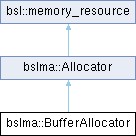#include <bslma_bufferallocator.h>

Public Types | |
| enum | AlignmentStrategy { MAXIMUM_ALIGNMENT , NATURAL_ALIGNMENT } |
| Types of alignment strategy to allocate memory. More... | |
| typedef void *(* | AllocCallback) (int) |
 Public Types inherited from bslma::Allocator Public Types inherited from bslma::Allocator | |
| typedef std::size_t | size_type |
Public Member Functions | |
| BufferAllocator (char *buffer, size_type bufSize, AllocCallback allocCallback=0) | |
| BufferAllocator (char *buffer, size_type bufSize, AlignmentStrategy strategy, AllocCallback allocCallback=0) | |
| ~BufferAllocator () BSLS_KEYWORD_OVERRIDE | |
| Destroy this buffer allocator. | |
| void * | allocate (size_type size) BSLS_KEYWORD_OVERRIDE |
| void | deallocate (void *address) BSLS_KEYWORD_OVERRIDE |
| This function has no effect for this buffer allocator. | |
| void | print () const |
 Public Member Functions inherited from bslma::Allocator Public Member Functions inherited from bslma::Allocator | |
| ~Allocator () BSLS_KEYWORD_OVERRIDE | |
| template<class TYPE > | |
| void | deleteObject (const TYPE *object) |
| template<class TYPE > | |
| void | deleteObjectRaw (const TYPE *object) |
| void | deleteObject (bsl::nullptr_t) |
| void | deleteObjectRaw (bsl::nullptr_t) |
 Public Member Functions inherited from bsl::memory_resource Public Member Functions inherited from bsl::memory_resource | |
| memory_resource () BSLS_KEYWORD_DEFAULT | |
| Create this object. Has no effect other than to begin its lifetime. | |
| memory_resource (const memory_resource &) BSLS_KEYWORD_DEFAULT | |
| virtual | ~memory_resource () |
| Destroy this object. Has no effect other than to end its lifetime. | |
| memory_resource & | operator= (const memory_resource &) BSLS_KEYWORD_DEFAULT |
| Return a modifiable reference to this object. | |
| BSLS_ANNOTATION_NODISCARD void * | allocate (size_t bytes, size_t alignment=k_MAX_ALIGN) |
| void | deallocate (void *p, size_t bytes, size_t alignment=k_MAX_ALIGN) |
| bool | is_equal (const memory_resource &other) const BSLS_KEYWORD_NOEXCEPT |
Static Public Member Functions | |
| static void * | allocateFromBuffer (int *cursor, char *buffer, size_type bufSize, size_type size, AlignmentStrategy strategy) |
| static void * | allocateFromBuffer (int *cursor, char *buffer, size_type bufSize, size_type size, int alignment) |
 Static Public Member Functions inherited from bslma::Allocator Static Public Member Functions inherited from bslma::Allocator | |
| static void | throwBadAlloc () |
Additional Inherited Members | |
 Protected Member Functions inherited from bslma::Allocator Protected Member Functions inherited from bslma::Allocator | |
| void * | do_allocate (std::size_t bytes, std::size_t alignment) BSLS_KEYWORD_OVERRIDE |
| void | do_deallocate (void *p, std::size_t bytes, std::size_t alignment) BSLS_KEYWORD_OVERRIDE |
| bool | do_is_equal (const memory_resource &other) const BSLS_KEYWORD_NOEXCEPT BSLS_KEYWORD_OVERRIDE |
Detailed Description
This class provides a concrete buffer allocator that implements the Allocator interface, and allocates memory blocks from a fixed-size buffer that is supplied by the user at construction. The allocator can supply memory that can be maximally (default) or naturally aligned.
Member Typedef Documentation
◆ AllocCallback
| typedef void *(* bslma::BufferAllocator::AllocCallback) (int) |
AllocCallback is an alias for (the address of) a function that takes an integer argument and returns void *.
Member Enumeration Documentation
◆ AlignmentStrategy
Constructor & Destructor Documentation
◆ BufferAllocator() [1/2]
|
inline |
Create a buffer allocator for allocating memory blocks from the specified buffer of the specified bufSize. Optionally specify a callback function allocCallback that is invoked when a call to allocate cannot be fulfilled from buffer. Note that maximum alignment is used when allocating memory.
◆ BufferAllocator() [2/2]
|
inline |
Create a buffer allocator for allocating memory blocks from the specified buffer of the specified bufSize. Use the specified alignment strategy to allocate memory. Optionally specify a callback function allocCallback that is invoked when a call to allocate cannot be fulfilled from buffer.
◆ ~BufferAllocator()
| bslma::BufferAllocator::~BufferAllocator | ( | ) |
Member Function Documentation
◆ allocate()
|
virtual |
Return a newly allocated block of memory of (at least) the specified positive size (in bytes). If size is 0, a null pointer is returned with no other effect. If this allocator cannot return the requested number of bytes, then it will return the result of invoking an optional callback function (supplied at construction); if no callback function was specified, throw a std::bad_alloc exception in an exception-enabled build, or else abort the program in a non-exception build. The behavior is undefined unless 0 <= size. Note that the alignment of the address returned depends on the alignment strategy (MAXIMUM_ALIGNMENT or NATURAL_ALIGNMENT) specified at construction of this buffer allocator. Also note that it is up to the callback function whether to return zero or throw an exception if this buffer allocator is unable to satisfy the request.
Implements bslma::Allocator.
◆ allocateFromBuffer() [1/2]
|
static |
Allocate a memory block of the specified size from the specified buffer at the specified cursor position. Return the address of the allocated memory block if buffer contains enough available memory, and null otherwise. The cursor is set to the index of the next available byte in buffer after the allocation. Use the specified alignment strategy (or alignment value) to allocate memory. If size is 0, do not allocate memory and return zero. The behavior is undefined unless 0 < = bufSize, 0 <= size, 0 < alignment <= bsls::AlignmentUtil::BSLS_MAX_ALIGNMENT, and alignment is an integral power of 2.
◆ allocateFromBuffer() [2/2]
|
static |
◆ deallocate()
|
inlinevirtual |
Implements bslma::Allocator.
◆ print()
| void bslma::BufferAllocator::print | ( | ) | const |
Write formatted debugging information to stdout describing the internal state of this buffer allocator.
The documentation for this class was generated from the following file: